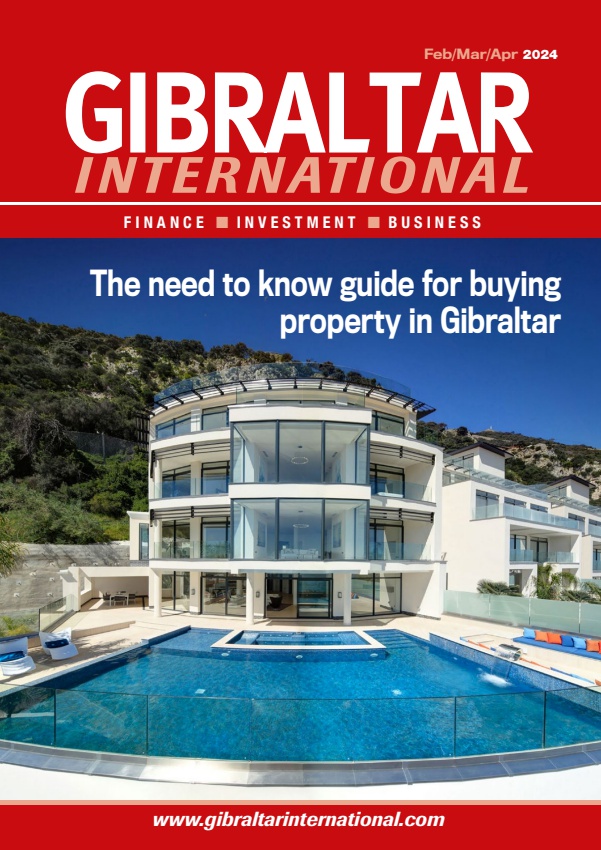Brexit and Gibraltar’s Funds
and Investments Industries
By James Lasry Deputy Chairman Gibraltar Funds and Investments Association and Head of Funds at Hassans International Law Firm
Most Gibraltarians were quite certain that the United Kingdom would vote to remain within the European Union. It came as quite a shock to many that the results of the referendum were for Brexit. Gibraltarians for their part, felt let down as they voted to remain in with a margin of 96%. What will Brexit mean for Gibraltar and for its funds and investments industries?
Probably the greatest difficulty that Gibraltar will face over the next few years is the simple uncertainty. Will the UK retain access to the single market? And if so, what scope and form will this take?
One thing is clear. Nothing precipitous will happen at least for the next two years and three months. It may take longer than this. The decision to exit the European Union is only the first in a long series of steps that have to occur for the separation to be given effect.
Under a recent amendment to the Treaty of Lisbon Article 50 provisions were put in place to allow for the secession of a member state from the European Union. Under these provisions, the famous ‘Article 50’, there will be an interim period of at least two years from the time that the article is invoked.
There are a number of results that are possible, ranging from the UK and therefore Gibraltar, remaining within the single market in a Norway type format, to the unlikely result of the UK having to rely on World Trade Organisation provisions. It is important to remember that the UK traded with the rest of Europe long before it joined the Common Market. There are a number of bilateral treaties that provide for this.
The upshot of this is that for at least the next two and a quarter years or so, financial services firms such as MIFID and AIFMD firms will be able to continue to passport throughout the EU.
As with everything, it is important to distinguish between the hype and the reality of the situation. The reality is that the majority of funds and investment managers in Gibraltar do not avail themselves of the European passport. This is either because they fall below the threshold under which they are obliged to comply or because they fall within certain other exemptions such as being family offices which do not market to the general public.
For funds that did not rely on the European passport, the change will make little to no difference to them at all. They will be in the same position as that of funds in the Channel Islands, the Cayman Islands, and the British Virgin Islands. Although there is a great deal of uncertainty as to what the final results of the negotiation between the United Kingdom and the EU will look like, most business between now and then will be able to proceed as usual.
There are so many possibilities that it does not seem neither reasonable nor necessary to incur the cost and upheaval of setting up elsewhere. We will have much more of a flavour of what the final results will look like 6-12 months from now.
It is still possible that the UK and Gibraltar will retain some access to the single market. However, if this is not the case, it is still possible it will obtain 3rd jurisdiction equivalence under AFIM and MiFID II so that funds and managers who are regulated under it can continue to passport.
The Government of Gibraltar is working very hard to try to ensure that Gibraltar be included in any arrangements between the UK and the EU. Because the UK is Gibraltar’s largest trading partner, bilateral agreements both for the provision of regulated services i.e. a bilateral financial services passport to and from the UK and, possibly a tax treaty between Gibraltar and the UK will be crucial. Efforts are being made to obtain what assurances are possible in this regard.
At present, one proposal that should be considered is that from now until the actual secession occurs, all new financial services legislation that is directive driven, such as MiFID II, should be enacted with dual channels; one that complies with European law which will be binding as long as we are in the European Union (or even thereafter for those who wish to passport on the basis of an equivalent regime) and the other, a local regime that is more purpose-built to the needs of local managers.
This latter regime must of course maintain current high regulatory standards, but it should also be entirely relevant to the industry that it seeks to regulate. Other jurisdictions such as the Channel Islands and even the UK have dual regimes for both the EU and non EU business.
Gibraltar should also review its products to ensure that they are up to date with the latest developments in both EU and non-EU legislations. The Experienced Investor Fund, Gibraltar’s flagship funds vehicle, should be improved and an equivalent of the RAIF and ICAV in Luxemburg and Ireland should be considered.
Gibraltar has managed to weather many storms and it is heartening to see how many Gibraltarians feel that although this is somewhat of a hurricane, Gibraltar will emerge from it intact, if not stronger. The opportunity to re-evaluate and redefine ones position can be truly frightening, but it can be an opportunity to improve on what was before.


